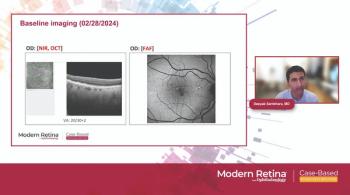
Belite Bio completes phase 3 clinical trial plans for LBS-008
According to the company, LBS-008 is an orally administered tablet intended as an early intervention to slow disease progression in patients affected with Stargardt disease and dry age-related macular degeneration.
Belite Bio Inc. today announced that, following discussions with the FDA, it has finalized the study design for its planned Phase 3 clinical trial to evaluate efficacy and safety of LBS-008 (Tinlarebant) in patients with geographic atrophy (GA) associated with Dry AMD.
Tom Lin, MD, CEO of Belite Bio, noted that the company was looking forward to kicking off its Phase 3 advanced Dry AMD study to bring forward an early intervention, once-a-day oral treatment for patients suffering from visual loss due to Dry AMD.
“The safety and efficacy of LBS-008 is currently being evaluated in a Phase 2 study and a Phase 3 study in patients affected by STGD1,” he said in a statement. “Considering that a common cause of disease progression in both GA and STGD1 is characterized by the aberrant accumulation of cytotoxic byproducts of vitamin A, we are optimistic for a positive outcome for LBS-008 in GA patients.”
Phase 3 Advanced Dry AMD Study Outline
- 2-year prospective, randomized (2:1, active:placebo), double-masked, placebo-controlled study designed to assess the efficacy and safety of daily oral LBS-008.
- Enrollment expected to begin in the first half of 2023 of at least 300 GA patients across multiple centers globally.
- The primary endpoint will be the change in GA lesion size from baseline to month 24, compared to placebo.
- An interim analysis of efficacy and safety is expected to be conducted at the mid-point of the study.
“Knowing that vision loss will likely occur in patients with more advanced GA, it is crucially important that we intervene early while retinal tissues are still viable to prevent irreversible damage,” said Quan Dong Nguyen, MD, MSc, FARVO, FASRS, Professor of Ophthalmology, Professor of Pediatrics, and Professor of Medicine at the Byers Eye Institute and Stanford University. “We are very pleased and quite encouraged that Tinlarebant is being evaluated in a Phase 3 study as a potential non-invasive, oral therapeutic option for patients with GA.”
About LBS-008
LBS-008 is a novel oral therapy intended as an early intervention to prevent the accumulation of vitamin A-based toxins (bisretinoids) that cause STGD1 and contribute to pathogenesis in Dry AMD. Bisretinoids are formed as by-products of vitamin A in the visual cycle.
LBS-008 works by reducing the level of serum RBP4, the carrier protein which transports the retinol to the eye. By modulating the amount of retinol entering the eye, LBS-008 reduces the formation of bisretinoids to preserve the health of retinal tissues.
Newsletter
Keep your retina practice on the forefront—subscribe for expert analysis and emerging trends in retinal disease management.










































